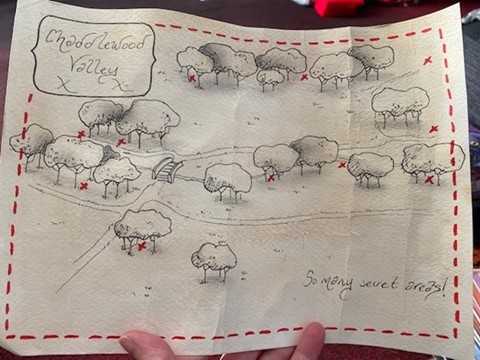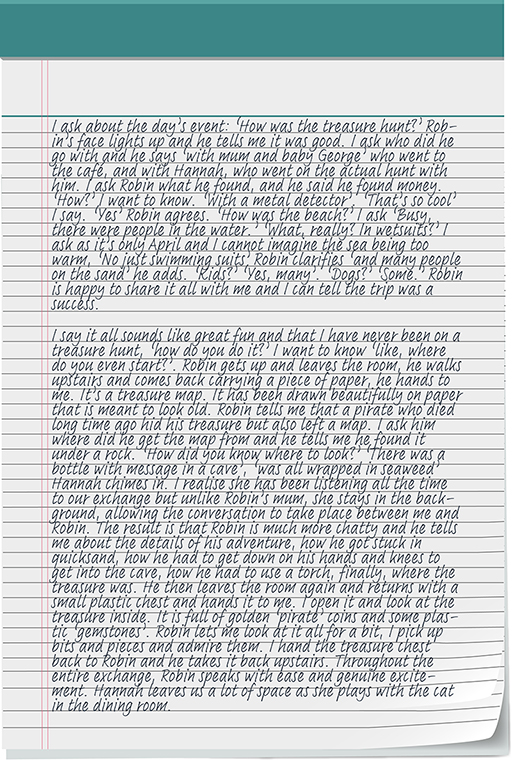3 Searching for treasure
For Robin, living well includes going on adventures and doing things that are fun. Robin likes metal detecting and hopes to join a local group. To help Robin to build confidence in forming relationships outside his family and staff team the service is supporting Robin to get to know his neighbours. Robin’s staff do creative activities, which Robin likes to do, including bespoke treasure hunts that they organise a couple of times a year.
Activity 3
Read Hannah’s description of the treasure hunts that Robin’s team organise for him. As you read, make notes on the aspects of the activity which support Robin to live well.
Hannah
The treasure hunts don’t happen too often so that Robin does not get bored of them. Usually, it’s once or maybe twice a year.
Pirate Nick (created by Robin when staff wrote his name in the sand) emails Robin with a hunt and posts the first map. I make the maps and we add markers for places of interest that Robin needs to find so he can find the treasure. Having the markers can help with planning and him relating the images to the actual place. Some maps have no markers, so he needs to try and figure out the places of interest. We try and get a good mix of places he can get to locally on public transport or by foot and places further away and maybe a new experience. He’s been to numerous woods, parks, and forts locally as well as four local areas of special interest. We always check to make sure the location is accessible for him although there have been places that looked ok but ended up being a poor choice. His favourite places are beaches as he thinks all pirates use to bury their treasure on beaches.
Robin has a bucket that has his treasure hunting items in it like a telescope, water, torches, pedometer, and space to put the treasure. He also brings a metal detector with him. He always checks to make sure he has all of his items. As we walk around Robin will look at his maps to find the places of interest, we then distract Robin by suggesting he either looks around whilst we discretely hide the coins, jewels, clues, or map. Robin gets quite excited when he finds anything! We always act surprised. People passing by usually take an interest in what he is doing and will play along. Once he is back home, he will email Pirate Nick with an update and await a response.
There is usually a treasure chest at the end or something a bit more special. The treasure chest map is usually a special one with different clues he must follow. He has so many chests of gold now though that we are now needing to look at other items he can find! He loves adventuring into caves in the hopes of finding bones or a chest. He will also bring a shovel with him but staff normally do the digging! His chest last year was buried at [name of place] and he even let a kid keep one of the jewels.
When he was in the previous residential home he only went out once every few months to the shop. The pirate weekend was on nearby so the leaflet was given to him with a piece of money and the treasure hunts soon began and he was out a few times a week. It's not very realistic so we try to use old famous pirates and create hunts around them, so he can also look them up and see pirates did exist a long time ago but not so much now.
Treasure hunts happen only a couple of times a year, but when they do, they are truly fun and Robin enjoys talking about them in detail.
Now read the field notes that the researcher made after visiting Robin for the second time:
Discussion
The ‘Treasure hunt’ activity is certainly something Robin loves to do, doing things you love is a key aspect of supporting people to age well. Through this activity Robin is also having positive relationships with the staff who support him, and the family members who join in the hunt.
In the final video in this session, listen to Ben reflecting on Robin’s support.

Transcript
Robin really enjoys the Treasure hunts arranged by the staff, however, these are infrequent activities. Robin spends most of his days at his home, gardening, and looking after his cats and aquarium fish. He plays computer games every day. He usually sees his mother every day (she comes over or he goes to her place down the road), he also phones her daily. Robin sees his brother and his children every week. Robin is okay to take the bus (he knows the routes of local buses very well) and sometimes he takes it to town with his support staff. He likes to go to the harbour (he lives in coastal city) where there are boats. At the time of the study, Robin’s team were talking about supporting a Robin to attend more social events.


